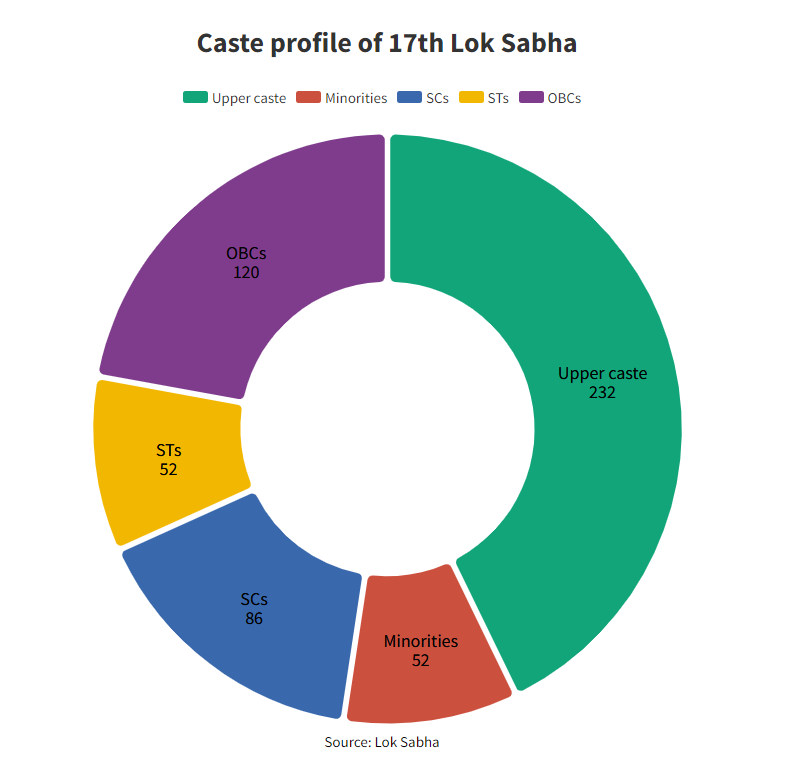Indian Polity
OBC Concerns in the Women's Reservation Bill, 2023
- 28 Sep 2023
- 8 min read
For Prelims: Women's Reservation Bill, 2023, Sub-Categorisation of OBCs, Supreme Court, Geeta Mukherjee report, Mandal Commission, Constitutional Status for NCBC,Justice G. Rohini Commission.
For Mains: Arguments in Favour and Against the Reservation of Seats for Women from OBCs, Historical Development of OBC Reservation.
Why in News?
The recent Women's Reservation Bill, 2023 has garnered attention due to its omission of a quota for Other Backward Classes (OBC) women. Critics point to the underrepresentation of OBCs individuals in key governmental positions as a related concern.
What are the Concerns Raised Concerning the Representation of Other Backward Classes?
- Context:
- The women's reservation bill 2023, which reserves 33% of seats for women in the Lok Sabha and state assemblies, does not include a quota for women from the OBCs.
- Also, unlike Scheduled Castes (SCs) and Scheduled Tribes (STs) , the Constitution does not provide for political reservation for OBCs in the Lok Sabha or state assemblies.
- The women's reservation bill 2023, which reserves 33% of seats for women in the Lok Sabha and state assemblies, does not include a quota for women from the OBCs.
- Issues Raised:
- Critics argue that OBCs who constitute 41% of the population ( National Sample Survey Organisation Survey 2006) are inadequately represented in the Lok Sabha, State Legislatures and Local governments.
- They have been demanding a separate quota for themselves in the Lok Sabha and state assemblies, similar to the reservation for SCs and STs.
- However, the government has not implemented such a quota, citing legal and constitutional hurdles.
- Several State Governments like Uttar Pradesh and Maharashtra have provided them representation in Local Body elections.
- But the Supreme Court has put a cap of 50% on the overall reservations (Vikas Kishanrao Gawali vs State of Maharashtra) which limits OBC reservation to 27%.
- This 50% upper limit is in line with the Indira Sawhney vs Union of India judgment.
- This decision has been criticized as 27% reservation is disproportionate to the OBC population in the states.
- But the Supreme Court has put a cap of 50% on the overall reservations (Vikas Kishanrao Gawali vs State of Maharashtra) which limits OBC reservation to 27%.
- Critics argue that OBCs who constitute 41% of the population ( National Sample Survey Organisation Survey 2006) are inadequately represented in the Lok Sabha, State Legislatures and Local governments.
- Current Strength of OBCs in Lok Sabha:
- The 17th Lok Sabha has around 120 MPs from the OBC community, which accounts for approximately 22% of the total Strength of Lok Sabha.
- Geeta Mukherjee Report:
- The Geeta Mukherjee report was a comprehensive review of the Women’s Reservation Bill that was first introduced in the Parliament in 1996.
- The report contained seven recommendations to improve the bill, which aimed to provide 33% reservation for women in both the Lok Sabha and state assemblies.
- Some of the recommendations are as follows:
- Reservation for a period of 15 years
- Including sub-reservation for Anglo Indians
- Including reservation in cases where the state has less than three seats in Lok Sabha (or less than three seats for SCs/STs)
- Including reservation for the Delhi assembly
- Reserving seats in Rajya Sabha and Legislative Councils
- Providing sub-reservation for OBC women after the Constitution extends reservation to OBCs
What are the Arguments in Favour and Against the Reservation of Seats for Women from OBCs?
| Arguments in Favor | Arguments Against |
|
|
What is the Historical Development of OBC Reservation in India?
- Kalelkar Commission (1953): The journey began with the establishment of the Kalelkar Commission in 1953, recognizing backward classes beyond SCs and STs on a national level.
- Mandal Commission (1980): The Mandal Commission Report estimated the OBC population at 52% and identified 1,257 backward communities. It recommended increasing quotas from 22.5% to 49.5% and extending reservation to OBCs.
- Following these recommendations, the central government implemented the reservation policy, reserving 27% of seats in union civil posts and services for OBCs under Article 16(4).
- This policy was also enforced in central government educational institutions under Article 15(4).
- "Creamy Layer" Exclusion (2008): The Supreme Court directed the exclusion of the "creamy layer" among OBCs to ensure reservation benefits reach the most disadvantaged.
- Constitutional Status for NCBC (2018): The 102nd Constitution Amendment Act granted constitutional status to the National Commission for Backward Classes (NCBC), elevating its authority and recognition in safeguarding the interests of backward classes, including OBCs.
- Justice G. Rohini Commission: The Justice G. Rohini Commission, inaugurated on October 2, 2017, in accordance with Article 340 of the Constitution and chaired by Justice G. Rohini, has recently submitted its report following nearly six years of work.
- The report underscores the imperative for sub-categorization among OBCs.
- This sub-categorization aims to allocate quotas within the existing 27% reservation to enhance opportunities for historically underrepresented OBC communities.
UPSC Civil Services Examination, Previous Year Question:
Q. Consider the following organizations/bodies in India: (2023)
- The National Commission for Backward Classes
- The National Human Rights Commission
- The National Law Commission
- The National Consumer Disputes Redressal Commission
How many of the above constitutional bodies?
(a) Only one
(b) Only two
(c) Only three
(d) All four
Ans: (a)







